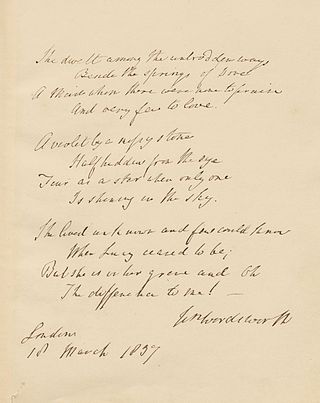
Kubla Khan: or A Vision in a Dream is a poem written by Samuel Taylor Coleridge, completed in 1797 and published in 1816. It is sometimes given the subtitles "A Vision in a Dream" and "A Fragment." According to Coleridge's preface to Kubla Khan, the poem was composed one night after he experienced an opium-influenced dream after reading a work describing Xanadu, the summer capital of the Mongol-led Yuan dynasty of China founded by Kublai Khan. Upon waking, he set about writing lines of poetry that came to him from the dream until he was interrupted by "a person on business from Porlock". The poem could not be completed according to its original 200–300 line plan as the interruption caused him to forget the lines. He left it unpublished and kept it for private readings for his friends until 1816 when, at the prompting of Lord Byron, it was published.

William Wordsworth was an English Romantic poet who, with Samuel Taylor Coleridge, helped to launch the Romantic Age in English literature with their joint publication Lyrical Ballads (1798).

Philomela or Philomel is a minor figure in Greek mythology who is frequently invoked as a direct and figurative symbol in literary and artistic works in the Western canon.
An idyll is a short poem, descriptive of rustic life, written in the style of Theocritus's short pastoral poems, the Idylls (Εἰδύλλια).

Sonnet 12 is one of 154 sonnets written by the English playwright and poet William Shakespeare. It is a procreation sonnet within the Fair Youth sequence.

"Ode: Intimations of Immortality from Recollections of Early Childhood" is a poem by William Wordsworth, completed in 1804 and published in Poems, in Two Volumes (1807). The poem was completed in two parts, with the first four stanzas written among a series of poems composed in 1802 about childhood. The first part of the poem was completed on 27 March 1802 and a copy was provided to Wordsworth's friend and fellow poet, Samuel Taylor Coleridge, who responded with his own poem, "Dejection: An Ode", in April. The fourth stanza of the ode ends with a question, and Wordsworth was finally able to answer it with seven additional stanzas completed in early 1804. It was first printed as "Ode" in 1807, and it was not until 1815 that it was edited and reworked to the version that is currently known, "Ode: Intimations of Immortality".
"Portrait of a Lady" is a poem by American-British poet T. S. Eliot (1888–1965), first published in September 1915 in Others: A Magazine of the New Verse. It was published again in March 1916 in Others: An Anthology of the New Verse, in February 1917 in The New Poetry: An Anthology, and finally in his 1917 collection of poems, Prufrock and Other Observations.
"London, 1802" is a poem by the English Romantic poet William Wordsworth. In the poem Wordsworth castigates the English people as stagnant and selfish, and eulogises seventeenth-century poet John Milton.
"Leisure" is a poem by Welsh poet W. H. Davies, appearing originally in his Songs of Joy and Others, published in 1911 by A. C. Fifield and then in Davies' first anthology Collected Poems by the same publisher in 1916.

"Strange fits of passion have I known" is a seven-stanza poem ballad by the English Romantic poet William Wordsworth. Composed during a sojourn in Germany in 1798, the poem was first published in the second edition of Lyrical Ballads (1800). The poem describes the poet's trip to his beloved Lucy's cottage, and his thoughts on the way. Each of its seven stanzas is four lines long and has a rhyming scheme of ABAB. The poem is written in iambic tetrameter and iambic trimeter.

"She Dwelt Among the Untrodden Ways" is a three-stanza poem written by the English Romantic poet William Wordsworth in 1798 when he was 28 years old. The verse was first printed in Lyrical Ballads, 1800, a volume of Wordsworth's and Samuel Taylor Coleridge's poems that marked a climacteric in the English Romantic movement. The poem is the best known of Wordsworth's series of five works which comprise his "Lucy" series, and was a favorite amongst early readers. It was composed both as a meditation on his own feelings of loneliness and loss, and as an ode to the beauty and dignity of an idealized woman who lived unnoticed by all others except by the poet himself. The title line implies Lucy lived unknown and remote, both physically and intellectually. The poet's subject's isolated sensitivity expresses a characteristic aspect of Romantic expectations of the human, and especially of the poet's condition.
In literature, the paradox is an anomalous juxtaposition of incongruous ideas for the sake of striking exposition or unexpected insight. It functions as a method of literary composition and analysis that involves examining apparently contradictory statements and drawing conclusions either to reconcile them or to explain their presence.

The Lucy poems are a series of five poems composed by the English Romantic poet William Wordsworth (1770–1850) between 1798 and 1801. All but one were first published during 1800 in the second edition of Lyrical Ballads, a collaboration between Wordsworth and Samuel Taylor Coleridge that was both Wordsworth's first major publication and a milestone in the early English Romantic movement. In the series, Wordsworth sought to write unaffected English verse infused with abstract ideals of beauty, nature, love, longing, and death.
"We are Seven" is a poem written by William Wordsworth and published in his Lyrical Ballads. It describes a discussion between an adult poetic speaker and a "little cottage girl" about the number of brothers and sisters who dwell with her. The poem turns on the question of whether to account two dead siblings as part of the family.
Lines Written at Shurton Bars was composed by Samuel Taylor Coleridge in 1795. The poem incorporates a reflection on Coleridge's engagement and his understanding of marriage. It also compares nature to an ideal understanding of reality and discusses isolation from others.

Poems, in Two Volumes is a collection of poetry by English Romantic poet William Wordsworth, published in 1807.
"The Weary Blues" is a poem by American poet Langston Hughes. Written in 1925, "The Weary Blues" was first published in the Urban League magazine Opportunity. It was awarded the magazine's prize for best poem of the year. The poem was included in Hughes's first book, a collection of poems, also entitled The Weary Blues.

Romanticism was an artistic, literary, and intellectual movement that originated in Europe toward the end of the 18th century. Scholars regard the publishing of William Wordsworth's and Samuel Coleridge's Lyrical Ballads in 1798 as probably the beginning of the movement in England, and the crowning of Queen Victoria in 1837 as its end. Romanticism arrived in other parts of the English-speaking world later; in the United States, about 1820.

Beachy Head (1807) is a long blank verse poem by the English Romantic poet and novelist Charlotte Turner Smith. Smith wrote Beachy Head between 1803 and 1806, near the end of her life, when she was struggling with debt and ill health. As the poem was being composed, Britain was engaged in the Napoleonic Wars with France, and Beachy Head was regarded as a likely invasion point for the French army; nonetheless, Smith continued to support French revolutionary ideals. The poem was published the year after her death, as part of the volume Beachy Head and Other Poems. It was her last poetic work, and has been described as her most poetically ambitious work.
The Song of Eärendil is the longest poem in The Lord of the Rings. In the fiction, it is sung and composed by the Hobbit Bilbo Baggins in the Elvish sanctuary of Rivendell. It tells how the mariner Eärendil tries to sail to a place of paradise, and acquires a Silmaril, a prized sun-jewel. Eventually he and his ship are set in the heavens to sail forever as the light of the Morning Star.










